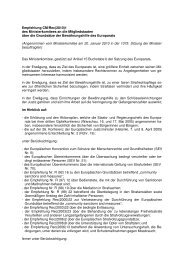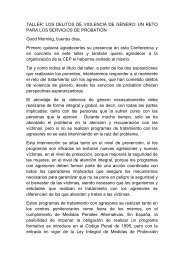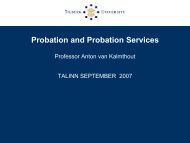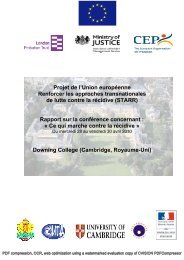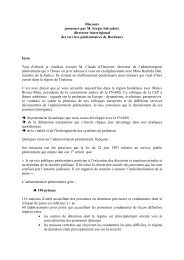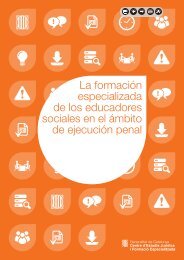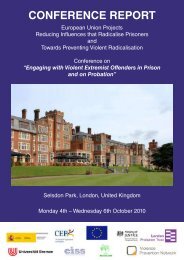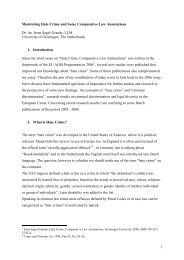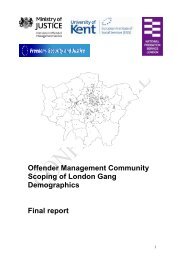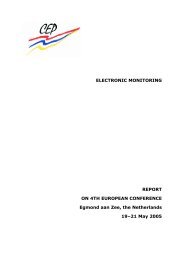New Directions in NOMS Domestic Abuse Programmes
New Directions in NOMS Domestic Abuse Programmes
New Directions in NOMS Domestic Abuse Programmes
Create successful ePaper yourself
Turn your PDF publications into a flip-book with our unique Google optimized e-Paper software.
<strong>New</strong> <strong>Directions</strong> <strong>in</strong> <strong>NOMS</strong><br />
<strong>Domestic</strong> <strong>Abuse</strong><br />
<strong>Programmes</strong><br />
Paul Weatherstone. <strong>NOMS</strong> Lead for Prison and Probation <strong>Domestic</strong> <strong>Abuse</strong><br />
<strong>Programmes</strong>.<br />
RSG – Rehabilitation Services Group
Currently three accredited domestic abuse programmes <strong>in</strong> use <strong>in</strong><br />
Prisons and Probation: -<br />
• Integrated <strong>Domestic</strong> <strong>Abuse</strong> Programme (IDAP)<br />
• Community <strong>Domestic</strong> Violence Programme (CDVP)<br />
• Healthy Relationships Programme (HRP) – moderate and high <strong>in</strong>tensity<br />
versions<br />
For those considered unsuitable for group work programmes<br />
some <strong>in</strong>dividual non-accredited provision and other court sentences.<br />
RSG – Rehabilitation Services Group
Perpetrator programmes popular with both Courts and<br />
practitioners but: -<br />
• Long wait<strong>in</strong>g lists<br />
• High attrition rates (approx 35 – 40%)<br />
• Lack of robust evidence for effectiveness<br />
• Narrow focus (men <strong>in</strong> heterosexual relationships, “patriarchy” and “power<br />
and control”)<br />
• Not kept up with changes/developments <strong>in</strong> practice e.g. strengths-based<br />
approaches<br />
RSG – Rehabilitation Services Group
In response we have been tasked with creat<strong>in</strong>g…<br />
“… a new roll<strong>in</strong>g domestic violence programme which will allow<br />
easier access and more flexible delivery. This will <strong>in</strong>corporate<br />
more contemporary ideas and materials and have bolt on<br />
components that will address alcohol and substance<br />
misuse reduc<strong>in</strong>g the need for an additional programme<br />
requirement. The programme will be designed <strong>in</strong> both a<br />
group and one to one format”<br />
… with a focus on evaluation.<br />
RSG – Rehabilitation Services Group
Some Basics.<br />
• As a crim<strong>in</strong>al justice agency our primary aim is to reduce re-offend<strong>in</strong>g<br />
• “What Works” – programmes should be multi-modal, skills orientated,<br />
cognitive behavioural <strong>in</strong> their approach and should adhere to risk, needs<br />
and responsivity pr<strong>in</strong>ciples<br />
• “What Works” with violent offenders – effective <strong>in</strong>terventions use cognitive<br />
behavioural techniques, are <strong>in</strong>tensive … and <strong>in</strong>clude cognitive skills tra<strong>in</strong><strong>in</strong>g,<br />
role play and relapse prevention”<br />
• <strong>Programmes</strong> should target a range of relevant dynamic risk factors and use<br />
approaches and techniques that have been shown to achieve successful<br />
outcomes.<br />
RSG – Rehabilitation Services Group
Guid<strong>in</strong>g Pr<strong>in</strong>ciples.<br />
• Build<strong>in</strong>g on the past. Reta<strong>in</strong><strong>in</strong>g an <strong>in</strong>tegrated approach – ma<strong>in</strong>ta<strong>in</strong><strong>in</strong>g<br />
exist<strong>in</strong>g <strong>in</strong>frastructures e.g. victim services, work<strong>in</strong>g collaboratively<br />
• A more <strong>in</strong>dividualised approach – develop<strong>in</strong>g a more differentiated response<br />
that enables the <strong>in</strong>dividual to better understand his abusive behaviour <strong>in</strong><br />
order to effect change<br />
• A more holistic approach that enables us to reta<strong>in</strong> the possible <strong>in</strong>fluences of<br />
patriarchy and male privilege while allow<strong>in</strong>g us to take account of other<br />
explanations for why some men assault their partners<br />
• A more flexible approach – roll<strong>in</strong>g, closed, group, 1-1, same sex violence<br />
etc.<br />
RSG – Rehabilitation Services Group
Innovations and aspirations<br />
• A “new” model of offend<strong>in</strong>g/change reta<strong>in</strong><strong>in</strong>g a multifactorial explanation for<br />
dv (the “Nested Ecological Model”) supplemented by the “General<br />
Aggression Model” (GAM) (Anderson and Bushman)<br />
• Strengths-based approach us<strong>in</strong>g “Good Lives” pr<strong>in</strong>ciples<br />
• The use of pr<strong>in</strong>ciples/approaches associated with Narrative Therapy and<br />
“M<strong>in</strong>dfulness”<br />
• Optional “bolt-on” modules to address specific, <strong>in</strong>dividual areas of concern<br />
e.g. alcohol abuse, effects of military service, parent<strong>in</strong>g etc<br />
RSG – Rehabilitation Services Group
Challenges<br />
• Time – new programme to be piloted <strong>in</strong> Jan/Feb 2011<br />
• F<strong>in</strong>ancial climate – new programme has to fit with exist<strong>in</strong>g resourc<strong>in</strong>g<br />
models for prison and Probation programmes <strong>in</strong>clud<strong>in</strong>g tra<strong>in</strong><strong>in</strong>g<br />
• Creat<strong>in</strong>g an effective evaluation process to enable us to demonstrate that<br />
the programme “works”<br />
• “Sell<strong>in</strong>g” the programme to commissioners and practitioners <strong>in</strong> the face of<br />
competition<br />
RSG – Rehabilitation Services Group
Paul Weatherstone<br />
paul.weatherstone@noms.gsi.gov.uk<br />
RSG – Rehabilitation Services Group



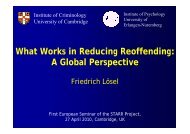
![AGIS2 Nov 08 Conference Report_[Version 2] - CEP, the European ...](https://img.yumpu.com/50764570/1/190x245/agis2-nov-08-conference-report-version-2-cep-the-european-.jpg?quality=85)
